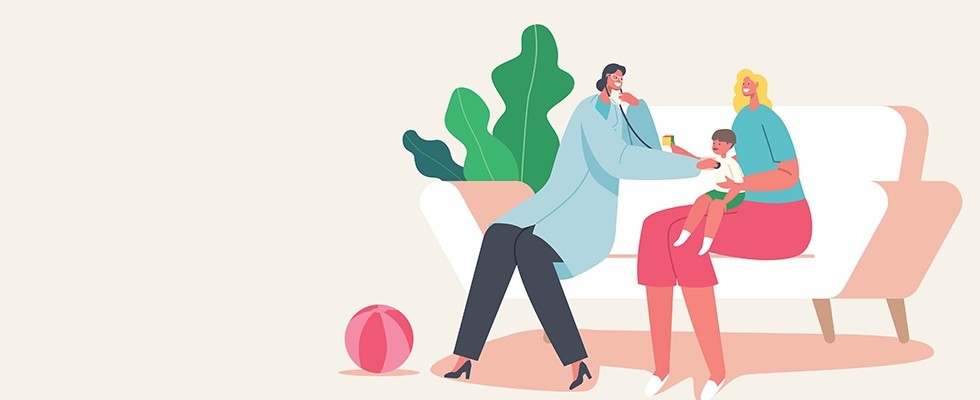
People preparing to become parents are not usually expecting to have a child with medical complexities or special needs. When this is the reality, parents suddenly find themselves in a frightening and complicated situation—navigating hospitals, disease information, health care providers, durable medical equipment providers, insurers and school systems. It is overwhelming and frightening for many, especially as they transition home from the hospital. While they are taking care of their child who has complex medical needs, they are often trying to work and care for other children at the same time. Adjusting to life at home can be difficult without dedicated help and support.
In pediatric home nursing, we take care of not just the child but the entire family. Each client and family situation is unique, and caregivers have to involve the entire family while caring for their client in the home.
Pediatric home nurses are highly skilled and competent, often providing not only clinical care, but also family education, support, reassurance and respite while working diligently with children to reach their developmental milestones. Being an integral part of their daily lives for months or years, nurses often develop close relationships with the client, parents, siblings and grandparents. It’s fulfilling in that regard, too, because they get to see their client’s progress and celebrate their accomplishments like part of the family milestones—like watching a child roll over for the first time, take their first step or attend their prom.
Building a Foundation
Training for pediatric nurses is fundamentally different from those caring for adults because they are working with fundamentally different diagnoses. Unlike adult diseases like amyotrophic lateral sclerosis (also known as ALS or Lou Gehrig’s disease), there may not be a projected course of illness. Each child is unique and on their own medical and developmental journey, requiring an extremely personalized and specialized care plan.
Common pediatric diagnoses one might see in private-duty nursing include prematurity, chronic respiratory and airway complications, neuromuscular disorders, epilepsy, congenital cardiac disease and other childhood diseases.
Pediatric nursing is as much about developmental progress as it is about clinical care. Nurses may get their young clients up in the morning, perform their initial care and assessment, ride the bus to school with them, tend to their medical needs and support their socialization and participation at school, then ride the bus home again.
Back home, nurses provide their respiratory treatments, suction, tracheostomy care and changes, gastrostomy tube feedings, catheter care, complex medication regimens and ventilator management. They provide their therapies and one-on-one interaction, constantly engaging with clients, encouraging them to continue to make progress, gain independence and live their best lives at home. Often, with loving support, individual attention and encouragement and specialized, skilled care from their homecare team, children far exceed the initial prognoses and expectations of their doctors.
Trends & Current Issues
A lot has changed during the decades we have been in this business, presenting emerging challenges for the homecare industry and the U.S. health care system as a whole.
Simply put, the United States is caring for more minors with more serious and medically complex diagnoses than ever before. As these children grow into adulthood, our health care system will be increasingly challenged to care for individuals living with rare or progressive diseases that were seldom seen before.
For example, take the childhood illness spinal muscular atrophy (SMA), which is associated with weakness of the voluntary muscles. In the past, infants diagnosed with SMA typically did not have a long life expectancy. Today, with better medical technologies and advanced therapeutic options, prognoses and quality of life have significantly improved and clients are living long, meaningful lives into adulthood.
It is not uncommon for our pediatric clients who have multiple diagnoses to see five or six specialists, sometimes two or three times a day. For example, they may have a pulmonologist, endocrinologist, neurologist, gastroenterologist, urologist and developmentalist. As they age, these medically fragile adolescents must negotiate care transitions into an adult world sometimes unaccustomed to their needs.
A Care Transition
Many of our pediatric clients must change hospitals or physicians when they reach a certain age. This can present challenges beyond losing the long-term relationships they have developed with their pediatric specialists. Physicians caring for adults may not be familiar with their pediatric diagnoses and conditions. Here in the BAYADA network, a care team helps to promote communication with doctors and consistency of care, advocating for the client’s needs and helping to bridge their transition from pediatric to adult health care services.
When a medically fragile individual turns 18, their parents must ensure they have guardianship in place. Depending on the state they live in, at 18 or 21, the individual’s coverage for in-home nursing may change to an adult waiver if there is one available in that state. Their home nursing coverage and hours may decrease, or they may lose home nursing completely.
BAYADA, along with its partners at Hearts for Home Care, advocates for client populations like these to deliver the care they deserve and need to stay safely at home with loved ones where they want to be, and where they can achieve their best outcomes and quality of life.
Another issue impacting health care as a whole is the growing nursing shortage. We are working to address this by offering entry-level career training pathways, such as the BAYADA Advance to LPN Program and other scholarship programs for employees to pursue nursing degrees. Through a new partnership, our partner organization BAYADA Education is sponsoring an accelerated bachelor of science in nursing program for college graduates new to nursing.
We encourage our colleagues to join us in finding more solutions and opportunities to provide consistent, high-quality care for more individuals as they transition through all stages of life.
